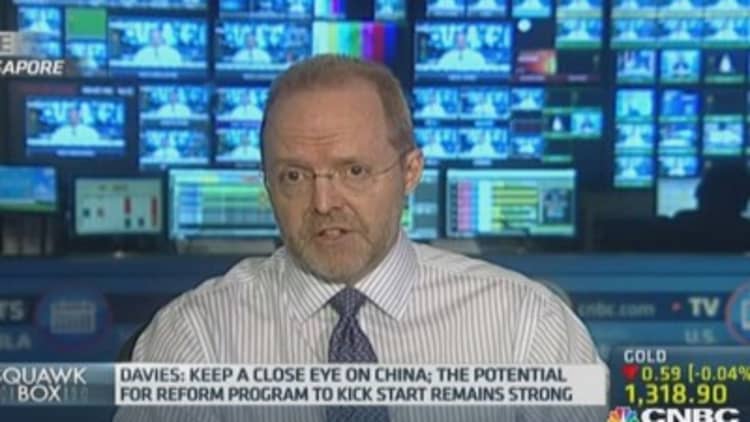
This week in Asia will be busy with India's federal budget, elections in Indonesia and Chinese data likely to dominate the headlines.
Tuesday
The week starts in Tokyo, where Japan's current account data for May is due. The world's third-largest economy posted a lower-than-expected trade surplus in April. Investors will be looking to see whether May will mark a fourth straight month of surplus.
Read MoreFund managers set their sights on unloved Japan
Wednesday
Indonesian financial markets will be shut on Wednesday for the presidential elections, but traders will closely monitor the vote. Recent polls indicate a tight race between ex-army general Prabowo and Jakarta governor Joko "Jokowi" Widodo.
Read MoreIndonesia's election may be too close to call
"Jokowi is the candidate that the markets feel will be most conducive to economic management. If we were to see him win, I would expect that the rupiah would rally strongly to 11,500. Conversely, if Prabowo wins, that would be perceived as much less friendly and we'll see the rupiah sell off alongside Indonesian assets," said Jeffrey Halley, senior manager of FX trading at Saxo Capital Markets.
Wednesday also brings China's inflation and trade data for the month of June.
After consumer price inflation spiked to a four-month high of 2.5 percent on year in May, Moody's Analytics expects a slightly softer reading of 2.3 percent for June.
"The May increase was due to a spike in food prices, which eased in June. Overall price pressures are minimal thanks to the slowdown in housing, relatively stable energy prices, and ample supplies of consumer goods," the group said in a report.
Producer prices meanwhile are seen falling for the 27th straight month. Moody's attributes the deflationary trend to excess capacity in industries like steel and the housing slowdown since it reduces demand for raw materials.
Read MoreIMF sees no brutal slowdown in China
Thursday
India's budget, the first under Prime Minister Narendra Modi, will be the main event. The country's rising deficit, which spiraled to 4.6 percent of gross domestic product (GDP) in the 2013-2014 fiscal year, is a key concern for investors.
Among the measures expected to be announced are structural reforms like a goods and services tax, according to analysts at Deloitte.

"The government has proposed divesting public sector undertakings and will likely suggest other prudent measures to check the fiscal balance without compromising on kick-starting investments in infrastructure," the firm said in a report.
Read MoreUnder Modi,can India's economy take on China?
China's June trade report is also on tap. After exports in May surged an annual 7 percent, helping the country post a trade surplus from $35.9 billion, expectations are for tepid results.
Moody's Analytics' forecasts a $25 billion surplus, citing a likely slowdown in export growth as recent gains outpaced global demand.
Traders will also keep an eye on central bank decisions in South Korea, Indonesia and Malaysia. The former two aren't expected to take action but analysts expect Bank Negara Malaysia to hike interest rates.
Citing strong exports, firm inflation and household consumption, economists at Australia New Zealand Bank predict a 25 basis point increase.
Read MoreWhat 'Transformers' says about China's economy
Friday
Finally, the week ends with India's trade report for June. Moody's expects the country's trade deficit to narrow to $6.5 billion from May's $11 billion reading.
"Exports are growing solidly, helped by a low year‐ago base and a mild improvement in demand from the U.S. Imports have been contracting at a double‐digit pace but may start to stabilize as domestic confidence recovers and the government slowly winds back restrictions on gold imports, the group said.

